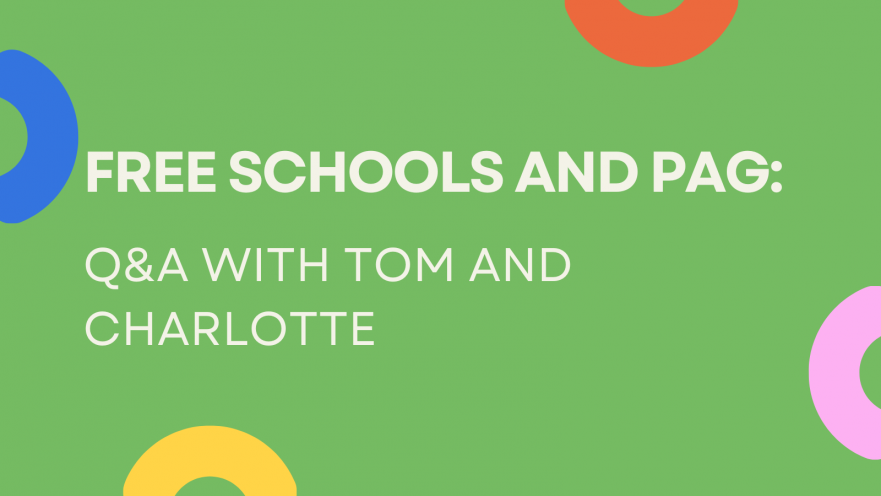Free Schools and PAG: Q&A with Tom and Charlotte
PAG’s Directors, Tom Legge and Charlotte Pearce Cornish, both have a wealth of experience with the Free School Programme. Tom has been involved from the start of the Free Schools movement, having led the team that placed the first ever free school proposal on the minister’s desk, the day after the 2010 General Election, whilst Charlotte has been working directly with free school proposers since Wave 2 of the process in 2011, across all areas from strategy to writing to financial planning to community engagement.
With the most recent free school waves coming to an end, we asked Tom and Charlotte to reflect on their experiences working with free schools.
How has the free schools programme changed/evolved since its inception?
Tom: I think CPC and I both remember when free schools were a movement and not a programme. While I still get a huge buzz for every school that I help open, there was something special about the first schools we opened in 2011 as we felt like the pioneers. I’ve just remembered we buried a time capsule at Eden Primary – that must be due to be dug up soon!
In 2011 a Deputy Director at the DfE said that we were building a bridge over a canyon one bit at a time and it certainly felt like that. We all fell down some holes during the early days and it still pains me that some of those early schools didn’t work out as, at the end of the day, the kids there didn't get the education they deserved. Fast forward to 2023 and the process is much slicker and perhaps inevitably has become dominated by MATs who have the resources and expertise to scale up. That said I’m still delighted that the programme allows new entrants like BRIT School North who we were delighted to support.
Charlotte: The whole education eco-system has changed so much in the last 13 years. Consultants who have joined PAG in the last five years don’t remember a world in which tens of new state schools weren’t being established across the country every year, but it was a huge innovation at the time.
The early days of the programme (or as Tom says, the movement!) were both exciting and nerve wracking. I was working for the free schools charity NSN at the time; frequently we would have a question from an applicant, we’d have to ask DfE, they’d have to ask their lawyers and then the answer would come back down the chain. It took quite a long time to work out whether academy trusts had directors or trustees, for example…
The country essentially running out of money had a big impact. Within the first three years, free schools went from being designed to be challengers and disrupters, offering parental and employment choice, to basically being the means by which new school places were provided in areas needing them. With the end of noughties baby boom very much in sight, it will be fascinating to see what happens next.
How has the free schools programme benefitted education over the last decade?
Tom: Without the free schools programme, there would have had to be some way to increase capacity and quality in the system. I do wonder whether another model would have delivered a Michaela Community School, A London Academy of Excellence or Rugby Free Primary and Secondary Schools
Charlotte: I agree with Tom that there are shining examples of best practice which have come out of the process. I’d add the incredible SEND and AP schools to his list – WAC Arts College and the Bridge Integrated Learning Space, for example. There are also some incredibly exciting applications going through the assessment process for both AP and SEND right now.
More generally, the free schools programme has been part of a rebalancing process which, at its best, empowers the teaching profession to lead the sector, rather than politicians. That’s the kind of change I’m passionate about supporting.
What has been the most satisfying/rewarding thing about working on free schools?
Tom: As a risk manager I tend to focus on the bits that we didn't get quite right and how we make sure we get it right next time. But, since you ask….
- The first day. Seeing the kids coming into a brand-new school in brand new uniform, none of which would have existed unless someone thought that we needed more/better and then did something about it
- The first football match. OK we lost but just seeing the team turning out in the new school colours…
- The first Ofsted. The best and worst days of my education life. No number of Good or Outstanding judgements blots out the pain of getting an Inadequate judgement. That said turning that around to Good in one cycle was possibly one of my proudest achievements – although all credit needs to go the staff, parents and kids.
Charlotte: as the director for the DfE’s supplier of support to free school applicants, it’s been intensely satisfying to help to improve the process for both the DfE and applicants at both the start of my career and now – coming full circle, as it were.
Tom’s a MAT trustee and free school founder in his own right, whereas I’m just a lowly consultant. But getting that invitation to attend a school opening into your inbox – nothing beats the feeling that you know you’ve played a tiny part in supporting England’s amazing educationalists to improve our education system and thus the lives of children and young people.
